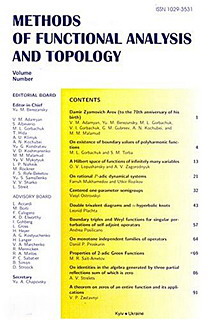E. W. Lytvynov
Search this author in Google Scholar
Quasi-invariance of completely random measures
Habeebat O. Ibraheem, Eugene Lytvynov
MFAT 24 (2018), no. 3, 207-239
207-239
Let $X$ be a locally compact Polish space. Let $\mathbb K(X)$ denote the space of discrete Radon measures on $X$. Let $\mu$ be a completely random discrete measure on $X$, i.e., $\mu$ is (the distribution of) a completely random measure on $X$ that is concentrated on $\mathbb K(X)$. We consider the multiplicative (current) group $C_0(X\to\mathbb R_+)$ consisting of functions on $X$ that take values in $\mathbb R_+=(0,\infty)$ and are equal to 1 outside a compact set. Each element $\theta\in C_0(X\to\mathbb R_+)$ maps $\mathbb K(X)$ onto itself; more precisely, $\theta$ sends a discrete Radon measure $\sum_i s_i\delta_{x_i}$ to $\sum_i \theta(s_i)s_i\delta_{x_i}$. Thus, elements of $C_0(X\to\mathbb R_+)$ transform the weights of discrete Radon measures. We study conditions under which the measure $\mu$ is quasi-invariant under the action of the current group $C_0(X\to\mathbb R_+)$ and consider several classes of examples. We further assume that $X=\mathbb R^d$ and consider the group of local diffeomorphisms $\operatorname{Diff}_0(X)$. Elements of this group also map $\mathbb K(X)$ onto itself. More precisely, a diffeomorphism $\varphi\in \operatorname{Diff}_0(X)$ sends a discrete Radon measure $\sum_i s_i\delta_{x_i}$ to $\sum_i s_i\delta_{\varphi(x_i)}$. Thus, diffeomorphisms from $\operatorname{Diff}_0(X)$ transform the atoms of discrete Radon measures. We study quasi-invariance of $\mu$ under the action of $\operatorname{Diff}_0(X)$. We finally consider the semidirect product $\mathfrak G:=\operatorname{Diff}_0(X)\times C_0(X\to \mathbb R_+)$ and study conditions of quasi-invariance and partial quasi-invariance of $\mu$ under the action of $\mathfrak G$.
The projection spectral theorem and Jacobi fields
MFAT 21 (2015), no. 2, 188–198
188–198
We review several applications of Berezansky's projection spectral theorem to Jacobi fields in a symmetric Fock space, which lead to L\'evy white noise measures.
A note on equilibrium Glauber and Kawasaki dynamics for permanental point processes
MFAT 17 (2011), no. 1, 29-46
29-46
We construct two types of equilibrium dynamics of an infinite particle system in a locally compact metric space $X$ for which a permanental point process is a symmetrizing, and hence invariant measure. The Glauber dynamics is a birth-and-death process in $X$, while in the Kawasaki dynamics interacting particles randomly hop over $X$. In the case $X=\mathbb R^d$, we consider a diffusion approximation for the Kawasaki dynamics at the level of Dirichlet forms. This leads us to an equilibrium dynamics of interacting Brownian particles for which a permanental point process is a symmetrizing measure.
A note on equilibrium Glauber and Kawasaki dynamics for fermion point processes
Eugene Lytvynov, Nataliya Ohlerich
MFAT 14 (2008), no. 1, 67-80
67-80
We construct two types of equilibrium dynamics of infinite particle systems in a locally compact Polish space $X$, for which certain fermion point processes are invariant. The Glauber dynamics is a birth-and-death process in $X$, while in the case of the Kawasaki dynamics interacting particles randomly hop over $X$. We establish conditions on generators of both dynamics under which corresponding conservative Markov processes exist.
An equivalent representation of the Jacobi field of a Lévy process
MFAT 11 (2005), no. 2, 188-194
188-194
On a spectral representation for correlation measures in configuration space analysis
Yuri M. Berezansky, Yuri G. Kondratiev, Tobias Kuna, Eugene Lytvynov
MFAT 5 (1999), no. 4, 87-100
87-100
Analysis and geometry on ${\mathbb R}_{+}$-marked configuration space
Yuri G. Kondratiev, Eugene W. Lytvynov, Georgi F. Us
MFAT 5 (1999), no. 1, 29-64
29-64
Euclidean Gibbs states for quantum continuous systems with Boltzmann statistics via cluster expansion
Yu. G. Kondratiev, A. L. Rebenko, M. Röckner, M. Röckner, G. V. Shchepanʹuk
MFAT 3 (1997), no. 1, 62-81
62-81
Dual Appell systems in non-Gaussian white noise calculus
MFAT 2 (1996), no. 2, 70-85
70-85
A generalization of Gaussian white noise analysis
Yu. M. Berezansky, V. O. Livinsky, E. W. Lytvynov
MFAT 1 (1995), no. 1, 28-55
28-55
Multiple Wiener integrals and non-Gaussian white noises: a Jacobi field approach
MFAT 1 (1995), no. 1, 61-85
61-85

